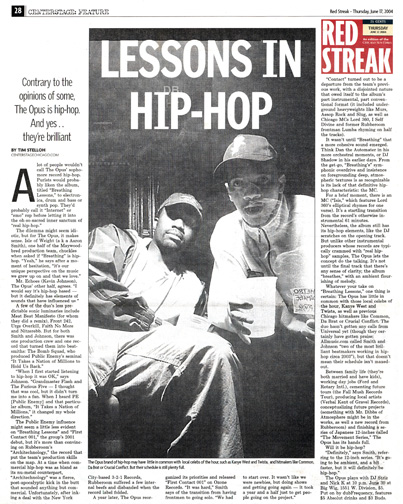
LESSONS IN HIP-HOP
CONTRARY TO THE OPINIOS OF SOME, THE OPUS IS HIPHOP. AND YES...THEY'RE BRILLIANT.
A lot of people wouldn't call The Opus' sophomore record hip-hop. Purists would probably liken the album, titled Breathing Lessons, to electronica, drum and bass or synth pop. They'd probably call it "internet" or "emo" rap before letting it into the oh-so-sacred inner sanctum of "real hip-hop."
The dilemma might seem idiotic, but for The Opus, it makes sense. Isle of Weight (a k a Aaron Smith), one half of the Maywood-bred production team, chuckles when asked if "breathing" is hip-hop. "Yeah," he says after a moment of hesitation, "it's our unique perspective on the music we grew up on and that we love."
Mr. Echoes (Kevin Johnson), The Opus' other half, agrees. "I would say it's hip-hop based - but it definitely has elements of sounds that have influenced us."
A few days of the duo's less predictable sonic luminaries include Meat Beat Manifesto (for whom they did a remix), Front 242, Urge Overkill, Faith No More and Nitzerebb.
But for both Smith and Johnson, there was one production crew and one record that turned them into beatsmiths: The Bomb Squad, who produced Public Enemy's seminal "It Takes a Nation of Millions to Hold Us Back."
"When I first started listening to hip-hop it was OK," says Johnson. "Grandmaster Flash and The Furious Five - I thought that was cool, but it didn't turn me into a fan.
When I heard PE [Public Enemy] and that particular album, "It Takes a Nation of Millions," it changed my whole direction."
The Public Enemy influence might seem a little less evident on "Breathing Lessons" and "First Contact 001," the group's 2001 debut, but it's more than convincing on Rubberoom's "Architechnology," the record that put the team's production skills on the map. At a time when commercial hip-hop was as bland as it nu-metal counterpart, "Architechnology" was a fierce, post-apocalyptic kick in the butt that sounded anything but commercial. Unfortunately, after inking a deal with the New York City based 3-2-1 Records, Rubberoom suffered a few internal beefs and disbanded when the record label folded.
A year later, The Opus reorganized its priorities and released "First Contact 001" on Ozone Records. "It was hard," Smith says of the transition from having frontman to going solo. "We had to start over. It wasn't like we were newbies, but doing shows and getting going again - it took a year and a half just to get people going on the project."
"Contact" turned out to be a departure from the team's previous work, with a disjointed nature that owed itself to the album's part instrumental, part conventional format (it included underground heavyweights like Murs, Aesop Rock and Slug, as well as Chicago MCs Lord 360, I Self Divine and former Rubberoom frontman Lumba rhyming on half the tracks).
It wasn't until "Breathing" that that a more cohesive sound emerged. Think Dan the Automater in his more orchestral moments, or DJ Shadow in his earlier days. From the get-go, "Breathing's" symphonic overdrive and insistence on foregrounding deep, atmospheric textures is as recognizable is its lack of that definitive hip-hop characteristic: the MC.
For a brief moment, there is an MC ("Isis," which features Lord 360's elliptical rhymes for one verse). It's a startling transition from the record's otherwise instrumental 61 minutes.
Nevertheless, the album still has its hip-hop elements, like the DJ scratches on the opening track. But unlike other instrumental producers whose records are typically crammed with "real hip-hop" samples. The Opus lets the concept do the talking. It's not until the final track that there's any sense of clarity; the album "breathes," with an ambient flourishing of melody.
Whatever your take on "Breathing Lessons," one thing in certain: The Opus has little in common with those local celebs of the hour, Kayne West and Twista, as well as previous hitmakers like Common, Da Brat or Crucial Conflict. The duo hasn't gotten any calls from Universal yet (though they certainly have gotten praise; Allmusic.com called Smith and Johnson "two of the most brilliant beatmakers working in hip hop circa 2003"), but that doesn't mean their schedule isn't maxed out.
Between family life (they're both married and have kids), working day jobs (Ford and Rotary Intl.), cementing future tours (the Fall Mush Records Tour), producing local artists (Verbal Kent of Gravel Records), conceptualizing future projects (something with Mr. Dibbs of Atmosphere might be in the works, as well a new record from Rubberoom) and finishing a series of Japanese 12-inches called "The Movement Series," The Opus has its hands full.
Will it be hip-hop?
"Definitely," says Smith, referring to the 12-inch series. "It's going to be ambient, and a bit faster, but it will definitely be hip-hop."
TIM STELLOH